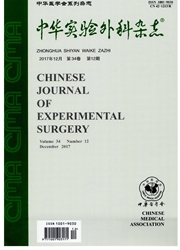

 中文摘要:
中文摘要:
Liver resection is the most effective treatment for hepatocellular carcinoma (HCC). The Barcelona Clinic Liver Cancer (BCLC) staging system is commonly accepted as a guideline for HCC treatment, but it only recommends liver resection for the patients with HCC at stage 0 to A1. The surgical indications of the BCLC staging system need to be re-evaluated. 120 HCC patients undergoing curative liver resection were retrospectively stratified to the BCLC staging system, and the survival of the patients at stages A, B and C was analyzed. The justification of the BCLC staging system was re-evaluated. Fifty-two patients were classified at stage A, 51 at stage B and 17 at stage C respectively. The hospital mortality of this cohort was zero and the morbidity was 24.1%. The 1-, 2-, 3-year overall survival rate of this cohort was 81.6%, 68.3%, and 57.5% respectively. There was no signifi-cant difference in the survival rate between the patients at stage A and B (P>0.05). If the treatment guidelines of BCLC staging system were followed, the majority of the patients at stages A and B (77.7%, 80/103) would not have been treated surgically. Our data suggest that the surgical indications of the BCLC staging system are not justified for HCC treatment. More studies may be needed as for how to further broaden the surgical indications of the BCLC staging system in the future.
 英文摘要:
英文摘要:
Liver resection is the most effective treatment for hepatocellular carcinoma (HCC). The Barcelona Clinic Liver Cancer (BCLC) staging system is commonly accepted as a guideline for HCC treatment, but it only recommends liver resection for the patients with HCC at stage 0 to A1. The surgical indications of the BCLC staging system need to be re-evaluated. 120 HCC patients undergoing curative liver resection were retrospectively stratified to the BCLC staging system, and the survival of the patients at stages A, B and C was analyzed. The justification of the BCLC staging system was re-evaluated. Fifty-two patients were classified at stage A, 51 at stage B and 17 at stage C respectively. The hospital mortality of this cohort was zero and the morbidity was 24.1%. The 1-, 2-, 3-year overall survival rate of this cohort was 81.6%, 68.3%, and 57.5% respectively. There was no signifi-cant difference in the survival rate between the patients at stage A and B (P〉0.05). If the treatment guidelines of BCLC staging system were followed, the majority of the patients at stages A and B (77.7%, 80/103) would not have been treated surgically. Our data suggest that the surgical indications of the BCLC staging system are not justified for HCC treatment. More studies may be needed as for how to further broaden the surgical indications of the BCLC staging system in the future.
 同期刊论文项目
同期刊论文项目
 同项目期刊论文
同项目期刊论文
 Outcomes of non-anatomic liver resection for hepatocellular carcinoma in the patients with liver cir
Outcomes of non-anatomic liver resection for hepatocellular carcinoma in the patients with liver cir 期刊信息
期刊信息
